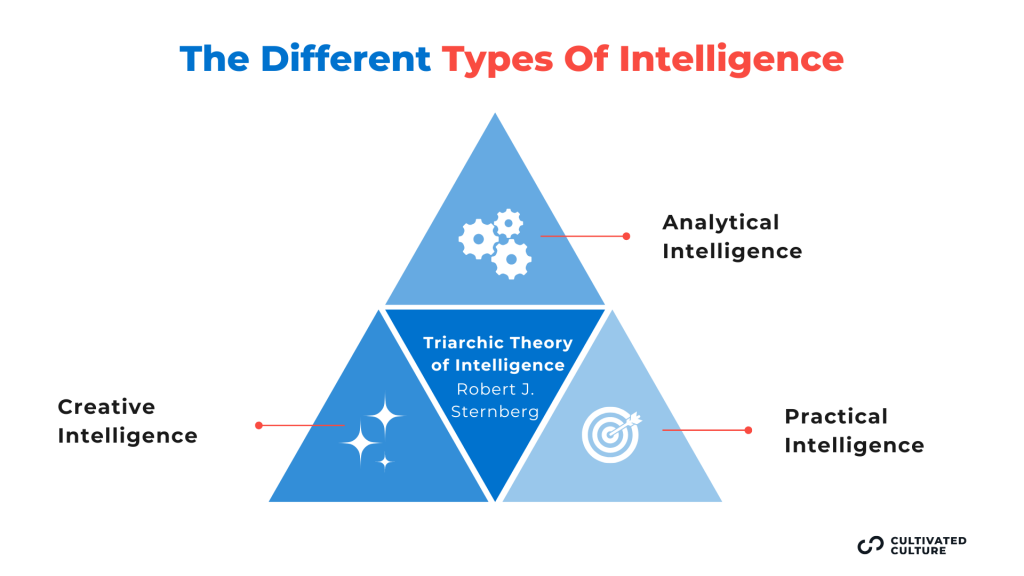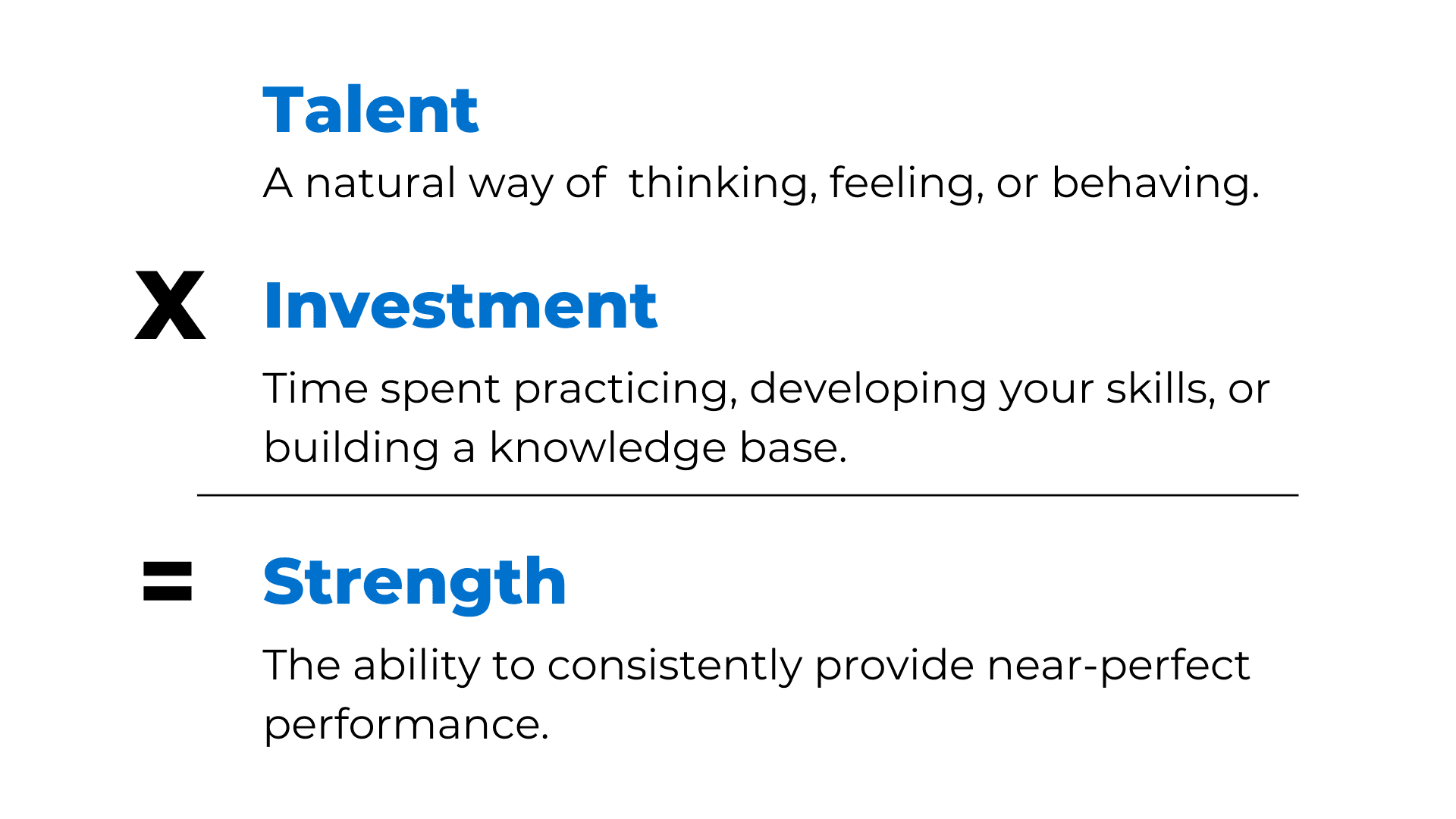Did you ever wonder why some courses in school were easier than others?
For example, you could ace a Math test without much preparation but struggle to pass English in spite of hours of studying?
Or maybe you were skilled with some assignments and had a hard time with others (I, for instance, could easily write reports but was awful at answering questions on the spot!).
There's an answer to this. It's something psychologists call “types of intelligence.”
Some types of intelligence are obvious. For example, logic and calculus are two areas we generally associate with intelligence.
Others aren't so obvious, but they play a key role in your professional success.
Learning about the different types of intelligence can help you understand more about your own adaptability, which you can apply to your career!
In this article, we'll learn more about the different types of intelligence. Read this piece from top to bottom or skip to the sections you're most interested in:
- How Many Types Of Intelligence Are There?
- The Different Types Of Intelligence
- Figuring Out Your Strengths For Your Career
- How To Identify Companies That Align With Your Type Of Intelligence & Strengths
- Ready To Take The Next Step In Your Career?
Let's dive in by starting with the first question:
How Many Types Of Intelligence Are There?
Several theories exist about different types of intelligence. However, one of the most popular theories that can be applied in the workplace is the Triarchic Theory of Intelligence, proposed by psychologist Robert J. Sternberg in 1985.
Sternberg's theory originated as an alternative to the concept of General Intelligence (G Factor), which refers to the existence of a broad mental capacity—a concept often used in IQ to measure a range of cognitive skills and processes. According to Sternberg, there are three types of intelligence: analytical, creative, and practical.
Truth be told, IQ tests haven't always shown to be super accurate in measuring one's intelligence and success.
Take the example of Richard Branson, who was diagnosed with dyslexia and a high-school dropout. When he dropped out of England's Stowe School at age 16, he heard from the institution's headmaster he would either go to prison or become a millionaire. He's never been arrested, so you can guess what path his life took!
Co-founder of the Virgin Group, the business magnate advocates for emotional intelligence, a theory popularized by Daniel Goleman. Branson even states: “If I had left my IQ and my school grades determine my success, I certainly wouldn't be where I am today.”
We'll be digging into Sterberg's theory, as well as Goleman's emotional intelligence framework in the next section!
The Different Types Of Intelligence
Like I said, there are multiple different theories about intelligence. However, in this article we'll be focusing on:
- Analytical Intelligence
- Creative Intelligence
- Practical Intelligence
- Emotional Intelligence
We could go all day (or more!) exploring all the different types of intelligence, but we'll be focusing on the ones that stand out most in organizational settings.
Let's begin with…
Sternberg's Triarchy Theory Of Intelligence
Stenberg's theory is comprised of three sub-theories, each relating to a specific kind of intelligence: the componential sub-theory, which corresponds to analytical intelligence and the ability to solve problems; the experiential sub-theory, corresponding to creative intelligence and the ability to deal with new situations; and the contextual sub-theory, which corresponds to practical intelligence and the ability to successfully function in specific environments.
Let's dive into each one:
#1 Analytical Intelligence
Analytical intelligence is the ability to solve problems. Whether it's by analyzing data, situations, or patterns, people with analytical intelligence are great at gathering all the pieces of the puzzle and putting them together.
Analytical people are often skilled with:
- Analytical Thinking: The ability to break down complex problems into smaller parts.
- Critical Thinking: Effectively evaluates different arguments and discerns logically.
- Problem-Solving: Use logic and reasoning to find solutions.
- Logical Reasoning: Engage in clear, logical thinking, including both deductive and inductive reasoning.
- Decision Making: Make decisions based on careful analysis.
People with analytical intelligence often choose career paths in Engineering, Computer Science, Finance, Science, Mathematics, Healthcare, Legal, and Business Analysis.
#2 Creative Intelligence
Some people may think that artistic talent is a sign of creative intelligence. However, Stenberg's definition of creative intelligence is actually associated with the ability to create innovative solutions and deal with new situations using past experiences and current skills.
People with creative intelligence are often skilled with:
- Innovative Thinking: The ability to approach problems and situations from a unique perspective.
- Adaptability: Easily adapt to new situations, challenges, and environments.
- Vision: The ability to visualize ideas and scenarios that don't exist yet.
- Flexibility Of Thought: The capacity to think about problems and ideas in different ways and from multiple angles.
- Insight: The ability to connect unrelated areas or concepts.
People with creative intelligence often choose career paths in Design, Content Creation, Marketing, Entertainment, Architecture, and Product Development.
#3 Practical Intelligence
Practical intelligence is often referred to as “street smart” and encompasses the ability to understand and deal with everyday situations. It's about applying the knowledge acquired from experience to solve real-world problems.
People with practical intelligence are often skilled with:
- Adaptability: Adjusting effectively to different environments or changing conditions.
- Social Understanding & Interaction: Capability of effectively managing relationships, communicating clearly and influencing others.
- Resource Management: The ability to manage resources like time, money, and human resources.
- Tactic Knowledge: Experiential knowledge that isn't taught in traditional academic environments.
- Common Sense: Understanding everyday situations and making decisions based on practical and straightforward reasoning.
People with practical intelligence often pursue career paths in Business Management, Sales, Marketing, and Healthcare. They also make great entrepreneurs!
Emotional Intelligence According To Daniel Goleman
Daniel Goleman popularized the concept of emotional intelligence in 1995 in his book “Emotional Intelligence: Why It Can Matter More Than IQ.” According to the psychologist, emotional intelligence is the ability to assess, express, and regulate emotions.
People with emotional intelligence are often skilled with:
- Self-Awareness: The ability to recognize and understand emotions, strengths, weaknesses, values, and motives.
- Self-Regulation: Effectively managing emotions and expressing them in a suitable manner, as well as managing impulses and adapting to changing circumstances.
- Internal Motivation: Driven by inner values and focus on goals for personal fulfillment, expressing commitment, initiative, and the drive to improve.
- Empathy: The ability to understand one's emotions and view situations from their perspective.
- Social skills: The ability to manage relationships effectively through clear communication, teamwork, and conflict management.
People with emotional intelligence are more likely to excel in multiple areas of life, both professionally and personally.
Figuring Out Your Strengths For Your Career
If you're anything like me, then you might have one question in mind after reading this article:
Where can I find an online assessment that identifies my type of intelligence?!
The bad news is that accurately identifying your type of intelligence may require the assistance of a certified psychologist.
The good news is, career-wise, you don't necessarily have to figure out your type of intelligence.
I know. Right now, you're probably going:
Say, what?! I've just read all this stuff about types of intelligence, and you're telling me I don't have to identify mine?!
Hold on, let me explain.
It's not that identifying your type of intelligence isn't worthwhile. But, for your career, it can be much more effective if you identify your strengths.
Let's dive in:
How To Identify Your Strengths
When we think about self-improvement, we often think about the weaknesses we could improve.
And that's totally valid—we can always improve on our weaknesses. However, we tend to neglect improving our strengths—and that's a huge mistake! If you improve on something you are naturally good at, you're betting on a winning horse. You're taking your talent to the next level.
Tom Rath, the author of StrengthsFinder, distilled this concept in what he calls “The Strenght Equation”. It goes something like this:
This approach is used in our coaching programs, where we focus on identifying your strengths to help you maximize your career potential.
You can take Tom Rath's StrengthsFinder quiz to find your top strengths and values or the HIGH5 test to figure out what you are naturally good at.
Strengths Vrs. Passion: Figuring Out What You Want To Do In Life
Before we move forward, let me make a disclaimer here: strengths aren't the same thing as passion.
You might be completely aware of your strengths and still have no clue about what you are passionate about.
And guess what? You probably won't figure out your passion unless you take action.
Here — Austin puts it way better in this LinkedIn Post:
Now, imagine if you could find your passion and put your strengths into it. The sky's the limit!
The first thing you want to do to find your passions is…
Map out your ideal lifestyle
You read it: your ideal lifestyle, not your ideal career.
Let me share my personal experience here.
In 2022, I had a major breakdown. I was feeling frustrated by seeing people around me coming from similar backgrounds advance into top corporate management roles while I was still making ends meet.
When I spoke to a friend about this, she asked: “Ok, but… do you really see yourself doing what they do?”
She knew I didn't.
Because the people around me were advancing into jobs that required commuting every day, attending corporate events, and working on environments that didn't appeal to me.
That's when I started reflecting more on what kind of life I pictured for myself instead of the career path that made more sense, given my background. When I began job seeking, I set new ground rules and started looking for jobs with:
- A remote setting and flexible hours
- A culture that resonates with my values
- An appealing job description, considering my strengths
Lucky for me, Cultivated Culture checked all the boxes!
Of course, I was also lucky enough to pick a career that allows me all this. That's why, if you haven't picked your path yet, you'll have to…
Reverse Engineer Your Career
Take that mindset and think about where you'd like to be in five years, regardless of your skills, background, experience, connections…
Look into the future and ask yourself what kind of lifestyle you'd like to have, then think about the possible careers that could provide you with this lifestyle.
Now, step back to the preset. Is there anything you enjoy in your current setup? Is there anything you absolutely hate? Reflecting on this will help you label your activities and compare them to potential jobs.
For example, you might decide that you want to work remotely in a Marketing role for a Fortune 500 company. That's awesome! But if you want to be sure about this, here are three things you should do first:
- Connect with people who are in the role you aspire and ask them for advice
- Use Career Explorer to see what careers match your personality
- Map out your “Energy Creators” versus your “Energy Drainers”: draw a line down on the middle of a blank sheet and list which activities boost your energy and which ones you find draining (mine would have “writing” on “Energy Creators” and “Meetings” on the “Energy Drainers”!)
These exercises will give you additional input to choose a career path!
Pro Tip: Don't restrict yourself to a single destination if you feel like there might be more than one! We're exploring options here.
Found Your Path? Now Identify Companies That Align With Your Type Of Intelligence & Strengths
Remember when I said one of my ground rules was finding a company with a culture that resonates with my values?
Well, the reason I added this to my priority list was because I realized the hard way that company culture makes a huge part of your personal fulfillment.
However, picking up on the company's culture isn't that easy.
Here are 7 tips for researching a company's culture before you say “yes” to their offer:
#1 Find out what a great culture means for you
“Great” is too broad a definition for a company culture. Plus, it can mean completely different things. Some companies promote a great culture through weekly meet-ups and events. But what if you don't want that?
List out everything you get with the new job and brainstorm three examples of what “great” looks like for each. Then, you can know if the culture aligns with your values.
#2 Read the company's benefits page
I know it seems obvious and you've probably already done this, but pay close attention while you're at it. Read everything you can about careers and benefits on the company's HR pages.
If you can find mentions of things that are important to you, awesome!
If not, dig deeper.
#3 Read Glassdoor reviews
Glassdoor reviews are a great way to learn about a company's culture because they provide information from the inside.
But there's a trick to finding the best, most honest reviews. You'll need to ignore the 1-star and the 5-star reviews: those are either outliers or manufactured.
The 2-4 star reviews are typically where you can find the good stuff.
#4 Listen to interviews with executives
Culture starts at the top, so you need to find out what company's leaders are talking about it!
Run a search for “ leadership team” and grab each leader's name. Then, search for “[name] interview culture,” “[name] podcast culture,” and “[name] keynote culture” and see what you can find!
#5 Find Employees who left for greener pastures
Head over to LinkedIn and run a search, then click on “All Filters”. Add your target company to the “Past Companies” filter and look for people who left for “better” opportunities. They are usually the ones who give the most objective information.
#6 Look up current employees online
Now, run a search on LinkedIn to find the people who already work in the company. Check out their profiles, Google their names, and check their social media profiles.
After you're done “stalking”, ask yourself: “Do these people share my values, interests, and goals?”
Because you'll be spending 40+ hours per week with them.
#7 Ask in interviews
The Q&A portion of the interview is a great time to ask questions about the company's culture.
Feel free to borrow the template below and weave it in your next interview:
“I read that is a big part of ‘s culture. Can you give me an example of how you've seen that play out in your time here?”
Now you have everything you need to decide if you'll take the offer!
Ready To Take The Next Step In Your Career?
If you feel that you found out what you're good at too late in life and that there is no time for a career change, think again. You can absolutely make that shift, even if you don't have traditional experience.
This proven framework will guide you in building the skills you need to change careers. It's helped people transition from teaching Spanish to high-school students to landing jobs at top companies like LinkedIn, go from a VP role in finance to a Program Manager role at Amazon, switch from Tech to Healthcare, and much more.
Hop over to the No Experience, No Problem course and get ready to change your life.
Good luck out there!






































